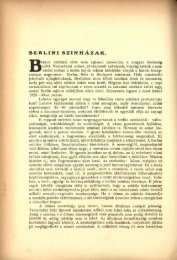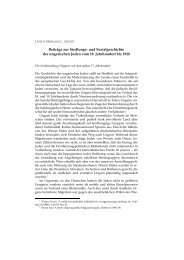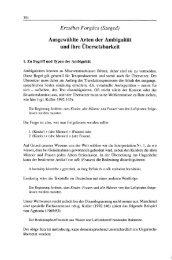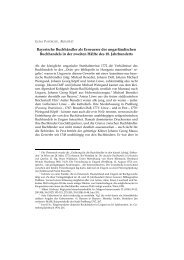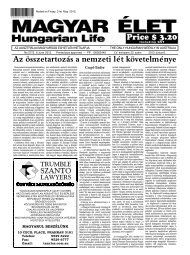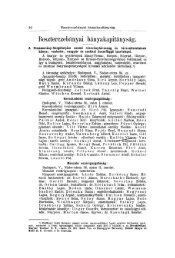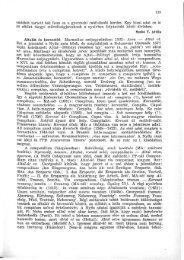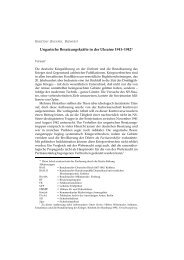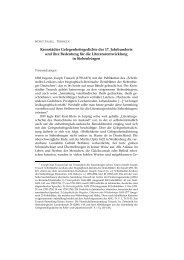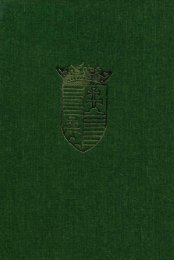hungarian studies - EPA - Országos Széchényi Könyvtár
hungarian studies - EPA - Országos Széchényi Könyvtár
hungarian studies - EPA - Országos Széchényi Könyvtár
You also want an ePaper? Increase the reach of your titles
YUMPU automatically turns print PDFs into web optimized ePapers that Google loves.
144 REVIEWS<br />
This, the second story the reader encounters in the anthology, is no doubt in Hungarian as<br />
different stylistically and tonally from "The Kiss" as it is in English, and one cannot help but<br />
feel that its translators, Zsuzsanna Horn and Paul Tábori, were more fortunate than Judith<br />
Szöllősy in being able to render their text playfully and wittily (as in the locution "fledgling<br />
days"). The adoption of the English fairy tale formula "Once upon a time" is good for starters,<br />
and the first sentence is a sure winner. The rest of the paragraph sustains tone and manner<br />
wonderfully well, and one is eager to read on. But if this is a story about a parrot and a woman,<br />
why the title "The Chicken and a Woman"? Read on and find out.<br />
But wait a moment. The parrot knew three words. The first we have figured out, the uncomplimentary<br />
term for a woman beginning with a wh and ending e. And the next two we have<br />
already been told, "Give me money!" What's going on here? Is Bródy pulling a fast one on his<br />
readers, is this some sort of postmodern puddle we are stepping into? Will this numerical<br />
confusion become part of a discombobulated fictive world he is slyly summoning into existence?<br />
Or is the translator, faced with a linguistic dilemma of how to render two Hungarian<br />
words, which can be rendered in English only with three words, being literally faithful to the<br />
text on the one hand while making it literally preposterous on the other? One reads on in part<br />
to find out.<br />
The closer one approaches the postmodern, and the end of the century, the more idiomatic<br />
the stories tend to sound to me. Take, for example, the opening paragraph of Mihály Kornis's<br />
"Father Wins":<br />
imagine I'm dead rejoice anarchy may set in and the whole thing<br />
started by me going to the Corvin to buy a cuisinart since I have said<br />
for the longest time that we ought to have a cuisinart and I am always<br />
shushed saying don't talk you don't have the vaguest idea about it it<br />
would be wonderful to be able to dice potatoes and make coffee in it<br />
at the same time and besides I saw one over at Mrs. Zengő it had a<br />
red base and it's East German and you will kiss my hand in gratitude<br />
and Mrs. Sas said I should go in and not worry I will have one because<br />
she adores me I always tell her that she is an enchanting slender<br />
elegant lady and this makes her swoon and do anything for me<br />
albeit her eyes are hyperthyroid and almost fall out and I occasionally<br />
feel like pushing them back in anyway<br />
Whereas Bródy 's used the "Once upon a time" at the outset of his story playfully to establish<br />
a formal narrative story-telling mode, Kornis's garrulous first-person narrator bursts<br />
forth in oral monologue, in which the formula "the whole thing started by" pops up momentarily<br />
to signal that a story is starting. What "the whole thing" was or is we don't know, nor do<br />
we know what started it, but that's what we are about to hear. In the meantime, "I have said<br />
for the longest time," an adept use of the American English locution "for the longest time,"<br />
helps clearly to establish an authentic "narrative speaker" voice. Who else would say "I am<br />
always shushed". It is almost something of a surprise to discover that the narrator is a Hungarian.<br />
The monologue's being "dubbed" into idiomatic, non-stop colloquial English, unpunctuated<br />
on the page, is, however, in its fashion no less a stylization than the sort of prose we encounter<br />
in Ady's "The Kiss," from earlier in the century. No one really talks like Kornis's monologist<br />
does; but ever since Molly Bloom's nonstop internal monologue in Joyce's Ulysses we have<br />
become accustomed to such bravura performances and the pleasures they can afford. The


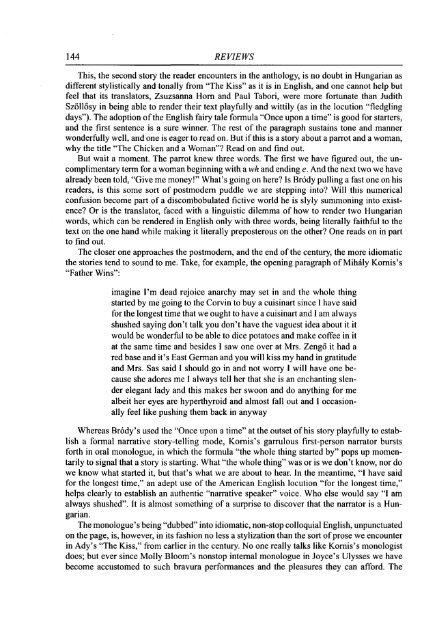
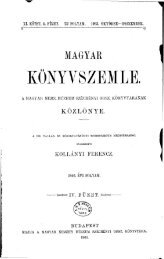
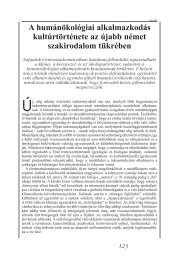
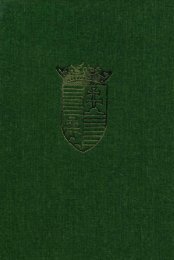
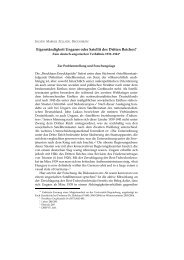
![Letöltés egy fájlban [36.8 MB - PDF] - EPA](https://img.yumpu.com/23369116/1/172x260/letoltes-egy-fajlban-368-mb-pdf-epa.jpg?quality=85)
